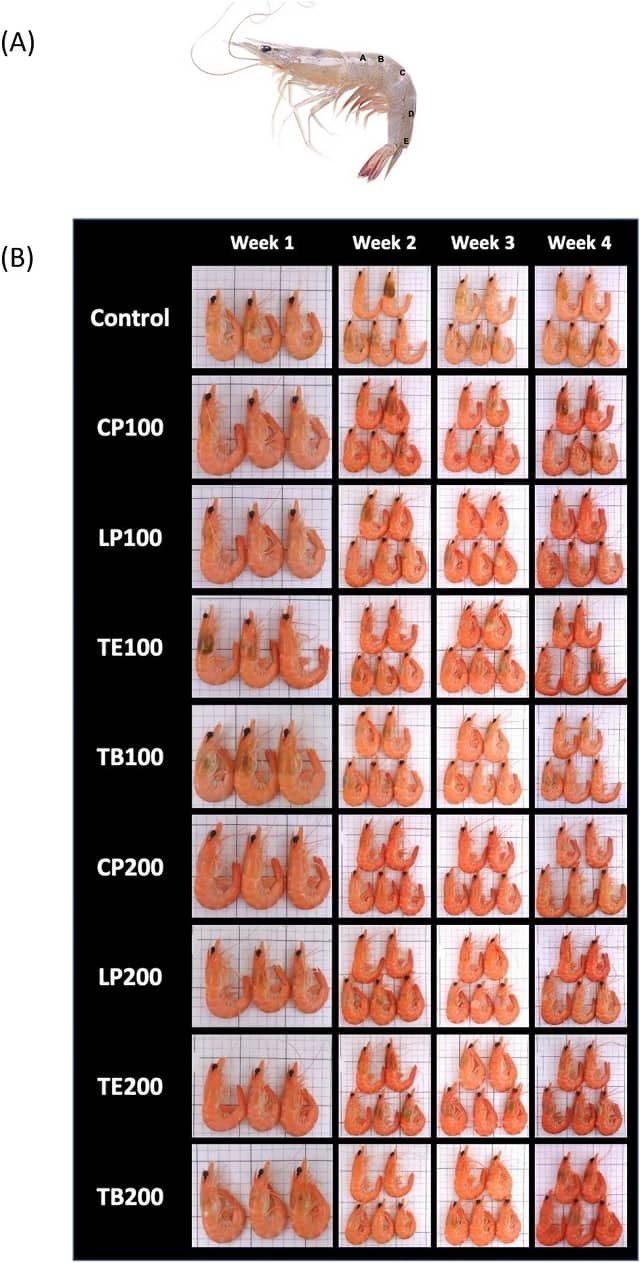Black soldier fly larvae (BSFL) are gaining popularity as a new alternative feed ingredient to replace fishmeal in aquaculture diets. In this regard, researchers from Sun Yat-Sen University studied the effect of different levels of black soldier fly larvae meal (BSFLM) on the antioxidant capacity, gut microbiota, and innate immune functions of white shrimp (Litopenaeus vannamei) in diets with low fishmeal content.
They formulated six experimental diets by replacing fishmeal (0%, 10%, 20%, 30%, 40%, and 50%) with BSFLM, based on a commercial shrimp diet.
Shrimp growth
“The study results show no significant differences in growth indicators between the control and BSFLM10 groups, but according to the regression analysis, shrimp growth performance decreases with additional increments of black soldier fly larvae meal,” they report.
Antioxidant activity
“The results of antioxidant enzyme activities and gene expression suggest that diets with low levels of black soldier fly larvae meal activate shrimp’s antioxidant capacity, while levels higher than 100 g/kg can induce oxidative stress,” they reported.
The researchers speculate that the inclusion of 80-100 g/kg of BSFLM in the diet may induce oxidative stress based on the MDA content in the shrimp.
“Although there was some evidence suggesting that specific dietary levels of BSFLM in shrimp can enhance innate immunity due to the toll1 regulation, significant decreases in the tak1 mRNA level can hinder the activation of Toll and IMD, implying weakened immune susceptibility,” they reported.
According to the study results, transcriptional level results suggest that black soldier fly larvae meal in the diet may be detrimental to innate immunity in shrimp. These genes must be translated into proteins to perform their functions, and therefore, the study authors recommend further research.
Analysis of gut microbiota
“The dominant phyla in the shrimp intestine after feeding with black soldier fly larvae meal were Proteobacteria, Actinobacteria, Verrucomicrobia, and Bacteroidetes, which represent 95% of the gut microbiota,” they reported.
The LDA score revealed a significant increase in the abundance of Proteobacteria in the BSFLM40 group and a significant increase in the abundance of Bacteroidetes in the BSFLM20 group, indicating that black soldier fly larvae meal may induce functional migration of gut microbiota.
Stay Always Informed
Join our communities to instantly receive the most important news, reports, and analysis from the aquaculture industry.
According to the study, gut microbiota analysis indicates that diets based on black soldier fly larvae meal alter the abundance of beneficial and opportunistic pathogenic bacteria. Moreover, while low levels of black soldier fly larvae meal increase the abundance of bacteria that can contribute to carbohydrate utilization, high levels can cause intestinal diseases and a low intestinal immune response.
Conclusion
The researchers conclude that 60-80 g/kg of black soldier fly larvae meal in the diet shows no adverse effects on shrimp growth, antioxidant capacity, and gut microbiota. They also highlight that 100 g/kg of black soldier fly larvae meal may induce oxidative stress and potentially weaken shrimp’s innate immunity.
The study was funded by the Project of Science and Technology of Guangdong Province, Central Government Guides Local Funds for Science and Technology Development of Science and Technology of Qinghai Province, Earmarked Fund for CARS-48, Project of China Postdoctoral Science Foundation, and Project of National Natural Science Foundation of China.
Contact
Wei Zhao
zhaow66@mail.sysu.edu.cn
Jin Niu
niuj3@mail.sysu.edu.cn
State key Laboratory of Biocontrol, Guangdong Provincial Key Laboratory for Aquatic Economic Animals and Southern Marine Science and Engineering Guangdong Laboratory (Zhuhai), School of Life Sciences, Sun Yat-Sen University, Guangzhou 510275, Guangdong Province, PR China
Reference (open access)
Yongkang Chen, Zhenxiao Zhuang, Jieping Liu, Ziqiao Wang, Yucai Guo, Anqi Chen, Baoyang Chen, Wei Zhao, Jin Niu. Effects of Hermetia illucens larvae meal on the Pacific white shrimp (Litopenaeus vannamei) revealed by innate immunity and 16S rRNA gene sequencing analysis. Comparative Biochemistry and Physiology Part D: Genomics and Proteomics, Volume 46, 2023, 101080, ISSN 1744-117X, https://doi.org/10.1016/j.cbd.2023.101080.
Editor at the digital magazine AquaHoy. He holds a degree in Aquaculture Biology from the National University of Santa (UNS) and a Master’s degree in Science and Innovation Management from the Polytechnic University of Valencia, with postgraduate diplomas in Business Innovation and Innovation Management. He possesses extensive experience in the aquaculture and fisheries sector, having led the Fisheries Innovation Unit of the National Program for Innovation in Fisheries and Aquaculture (PNIPA). He has served as a senior consultant in technology watch, an innovation project formulator and advisor, and a lecturer at UNS. He is a member of the Peruvian College of Biologists and was recognized by the World Aquaculture Society (WAS) in 2016 for his contribution to aquaculture.







